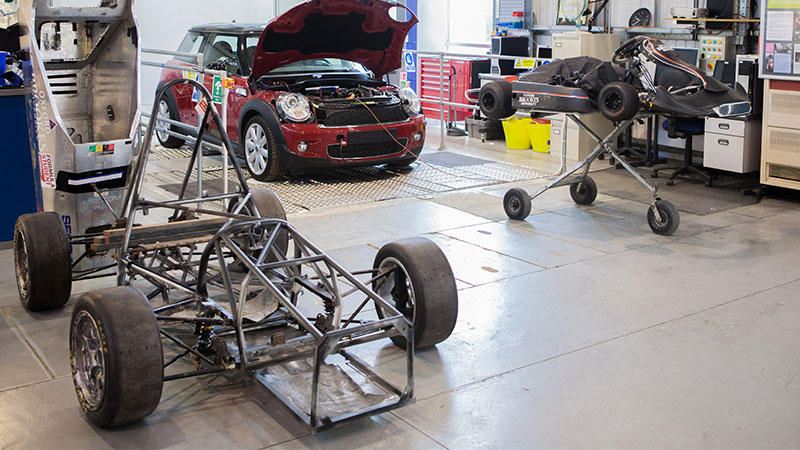Overview
Prepare for a career in automotive engineering with a combination of theory and practical, hands-on experience. Our ecosystem of automotive labs doubles as your research and learning space. You’ll have access to facilities including our High Voltage Energy Storage lab, driving simulator, the Joining Technology Research Centre, and #OxfordMetaverse, our virtual reality space.
During your time studying Automotive Engineering with Electric Vehicles, you can engage with activities and research groups through your dissertation and extra-curricular activities.
Visiting speakers from the industry help you get a fresh perspective on what’s going on in the profession of automotive engineering. They’ll share their expertise and experiences in technology, production methods, processes, and management techniques. This course is accredited by the Institution of Mechanical Engineers (IMechE) and the Institution of Engineering and Technology (IET).

Why Oxford Brookes University?
-
Great location
Oxford has one of Europe’s biggest concentrations of high-tech engineering businesses, and we have excellent links with many of them.
-
Leading Innovation
You’ll have the opportunity to be at the forefront of performance and be able to gain practical industry experience in electrical automobile engineering.
-
New State-of-the-art facilities
All Engineering and Motorsport courses are based in brand new, custom designed buildings at our main Headington site. You'll benefit from state-of-the-art facilities and equipment including a VR cave and material science labs, composite lab, autodynamics workshop and wind tunnel, as well as social learning spaces, teaching rooms and cafe space.
-
Taught by experts
The course is taught by current and former industry professionals, so everything you learn is up to date.
-
Hear from employers
You can see what your career options are in our Industrial Lecture Series, and attend our careers fair where employers and alumni visit Oxford Brookes.
-
Accreditation(s)
This course is accredited by the Institution of Engineering and Technology (IET) for the purpose of meeting the further learning requirement for registration as a Chartered Engineer. This course is also accredited by The Institution of Mechanical Engineers (IMechE).
Course details
Study modules
Please note: As our courses are reviewed regularly as part of our quality assurance framework, the modules you can choose from may vary from those shown here. The structure of the course may also mean some modules are not available to you.
Research
The emphasis in our research groups is producing high-quality research for the real world. Staff have close links with industry through research projects and consultancies.
Our engineering research is organised into three cross-cutting, interdisciplinary themes. Research in this area is supported by the UK Research Councils and the European Commission, industry and charitable foundations.
- Sustainable Engineering and Innovation
- Low Carbon Vehicles
- Simulation, Modelling and Systems Integration.
The results of the most recent REF (2014) exercise showed that 96% of research in the department is internationally recognised, and 57% was judged to be of world leading quality or internationally excellent, compared with 45% in 2008. More specifically, 50% of the impact case studies returned were judged to be internationally excellent, and 72% of the research outputs were judged to be internationally excellent or world leading.
Careers
Many of our engineering students have found success in their fields, in the UK and abroad. Graduates work with Mercedes HPP supporting development of Mercedes Formula E team and Williams Advanced engineering, supporting Jaguar Formula E team. Recent graduates are working for companies including:
- BMW,
- Jaguar Land Rover,
- Aston Martin Lagonda,
- McLaren Automotive,
- Tata Technologies,
- Koenigsegg Automotive,
- Porsche.
if you need support with your career, you’ll have access to our careers support system.
Entry requirements
Specific entry requirements
You should normally hold a first degree equivalent to at least a lower second-class bachelor's degree in aeronautical, automotive, electromechanical, mechanical, mechatonics, motorsport , or robotics engineering, or electronics with computer science, or a related discipline.
Please also see the University's general entry requirements.
English language requirements
If your first language is not English you will require a minimum IELTS score of 6.0 overall with 6.0 in all components.
OR
An equivalent English language qualification acceptable to the University.
Please also see the University's standard English language requirements.
Pathways courses for international and EU students
We offer a range of courses to help you meet the entry requirements for your postgraduate course and also familiarise you with university life in the UK.
Take a Pre-Master's course to develop your subject knowledge, study skills and academic language level in preparation for your master's course.
If you need to improve your English language, we offer pre-sessional English language courses to help you meet the English language requirements of your chosen master’s course.
English requirements for visas
If you need a student visa to enter the UK you will need to meet the UK Visas and Immigration minimum language requirements as well as the University's requirements. Find out more about English language requirements.
Terms and conditions of enrolment
When you accept our offer, you agree to the Terms and Conditions of Enrolment. You should therefore read those conditions before accepting the offer.
International qualifications and equivalences
How to apply
Application process
Tuition fees
Questions about fees?
Contact Student Finance on:
Tuition fees
The following factors will be taken into account by the University when it is setting the annual fees: inflationary measures such as the retail price indices, projected increases in University costs, changes in the level of funding received from Government sources, admissions statistics and access considerations including the availability of student support.
How and when to pay
Tuition fee instalments for the semester are due by the Monday of week 1 of each semester. Students are not liable for full fees for that semester if they leave before week 4. If the leaving date is after week 4, full fees for the semester are payable.
- For information on payment methods please see our Make a Payment page.
- For information about refunds please visit our Refund policy page
Additional costs
Please be aware that some courses will involve some additional costs that are not covered by your fees. Specific additional costs for this course are detailed below.
Compulsory costs
| Additional costs | Amount (£) |
|---|---|
| Personal protective equipment for engineering labs. | £25-40 |
Optional costs
| Additional costs | Amount (£) |
|---|---|
| Travel and associated costs if relevant when undertaking work placements. | £30-700 per year |
If you are considering bringing your own computer, most of the software we use is on Windows machines though there is some use of Linux. We do not use Apple MacOS and their use is not required but some students do choose to bring MacOS machines so a Mac can be a viable choice if you so wish.
|
£500-1200 |
It’s your responsibility to cover print / binding costs where coursework submission is required. Please note that a lot of the coursework is now submitted online. |
From £30 |
| You may choose to purchase books to support your studies. Many books on our reading lists are available via the Library, or can be purchased secondhand. | £20-60 per book |
Accommodation fees in Brookes Letting (most do not include bills) |
£107-301 per week |
Accommodation fees in university halls (bills included, excluding laundry costs) |
£139-248 per week |
Graduation costs include tickets, gowning and photography. Gowns are not compulsory but typically students do hire robes, starting at £41. |
Typically £0-200 |
Students are responsible for their own travel to and from university for classes. For the 2025/26 academic year, the University is introducing an alternative subsidised travel offer for all students with further information on our Travel webpages. |
From £10 |
Funding your studies
Financial support and scholarships
Featured funding opportunities available for this course.
All financial support and scholarships
Programme changes:
On rare occasions we may need to make changes to our course programmes after they have been
published on the website. For more information, please visit our
changes to programmes page.




